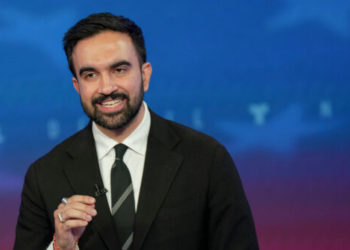U.S. President Donald Trump’s decision to end sanctions on Syria is welcome news. When the dictatorship of Bashar al-Assad fell in December, the country was one of the most heavily sanctioned places in the world, and Washington’s economic chokehold curbed its chances of recovering from a brutal war. Trump has taken major steps to loosen U.S. restrictions. But fully ending sanctions—and their effects—is not easy. The Trump administration has a tough road ahead if it intends to make good on the president’s promise.
Trump is the first U.S. president to take such a bold step on sanctions relief. Past administrations removed sanctions on pariah nations incrementally, and always in exchange for painstakingly negotiated actions from the sanctioned parties. The relief that the Obama administration offered Iran when it signed the nuclear deal was so complicated that it became the subject of an entire book. By contrast, Trump’s simple pledge in Riyadh suggested that he was ready to end sanctions on Syria practically without reservations.
His administration’s quick action to provide relief shows that he means it. Sweeping sanctions exemptions issued on May 23 made it possible to carry out most previously banned transactions with Syria, including those by foreign investors. The U.S. Treasury’s expansive general license and the State Department’s waiving of the Caesar Syria Civilian Protection Act have effectively canceled large parts of Washington’s near-full embargo.
But Syria remains under a web of overlapping U.S. sanctions regimes, some of which have been in place since 1979. They include a state sponsor of terrorism designation, a foreign terrorist organization designation on Hayat Tahrir al-Sham (or HTS, the jihadi group from which acting Syrian President Ahmed al-Sharaa hails), and punishing legislation such as the Caesar Act and the Syria Accountability Act.
In order to fully undo these and other sanctions, additional action is required by the departments of State, Treasury, and Commerce as well as Congress. The administration must go even further if it wants to ensure that sanctions relief improves the situation on the ground.
The president will contend with political hurdles along the way. Those opposed to immediate sanctions relief have understandable concerns about giving too much too fast to Syria’s new leaders. These leaders’ early links to al Qaeda, even if HTS disavowed that group almost a decade ago and has been fighting it since, give U.S. policymakers understandable pause.
Six months is too short a period to prove that the new Syrian government will align with U.S. values and interests, although Sharaa’s tone has been encouraging so far. He has made commitments to a governance model that embraces Syria’s diverse makeup and pursued peaceful relationships with neighbors (including Israel).
But other factors warrant caution. Sharaa has concentrated significant authority in his own hands, making some Syrians fear a new order that veers toward authoritarianism. Bloody clashes in early March that were accompanied by massacres of civilians perpetrated by pro-government factions, albeit acting outside of state orders, demonstrated the challenges that lie ahead.
Senior Republican U.S. Sen. Lindsey Graham seems to have reservations about Trump’s stance in part because he senses Israeli opposition. Many of Trump’s own advisors are rumored to be opposed to sanctions relief given the Syrian president’s past al Qaeda connections, and some have publicly expressed skepticism about Syria’s new rulers.
It’s possible that Trump may feel pressure from within his party and administration to backtrack and impose conditions before offering further sanctions relief, perhaps along the lines of the five demands that he raised with the Syrian president in their meeting on May 14. Past U.S. presidents, including Trump himself, have been accused of shifting the goalposts for sanctions removal in other places. U.S. Secretary of State Marco Rubio left the door open to this possibility when he said that he expects sanctions relief to be followed by the Syrian government’s prompt actions on policy priorities, although he stopped short of explicitly applying conditions to the sanctions relief.
Still, there is ample evidence that lifting sanctions can help smooth Syria’s path toward a more peaceful and prosperous future as well as reduce the chances of the country drifting into renewed chaos and instability. Sanctions have prevented Syria from rebuilding and crippled the ability of the authorities to meet the basic needs of a population suffering from a 90 percent poverty rate and a deepening hunger crisis—such as by paying public sector salaries and securing fuel and electricity. Failure by the authorities would benefit internal and external spoilers and hasten Syria’s descent into chaos.
Taking precautions against instability makes sense, especially because sanctions relief is reversible. Sanctions could be reimposed if Syria’s new leaders fail to live up to their commitments to their people and the international community. Anyway, the relevance of many U.S. sanctions is questionable given that they were a reaction to the atrocities of Assad, who is no longer in power.
Even with the momentum toward ending U.S. sanctions, though, an outstanding question is whether Trump can actually offer meaningful relief.
Other countries also impose sanctions over which the United States has no control. While the European Union and the United Kingdom have largely lifted their restrictions on Syria, the United Nations Security Council maintains its sanctions on HTS, with which all member countries—including the United States—are expected to comply. Some countries, such as Canada, have yet to significantly update their laws. Pending further action, sanctions will plague Syria’s economy even after U.S. restrictions end.
The Trump administration’s exemptions, while probably the broadest in history, also do not cover everything. Export control restrictions still prohibit the export to Syria of almost all goods from the United States, as well as goods from other countries that contain just 10 percent of U.S.-origin content. The exemptions do nothing to mitigate the steep criminal penalties that stem from the foreign terrorist designation on HTS, which are anathema to investors and nongovernmental organizations.
Exemptions alone won’t cut it. Lessons from Afghanistan after the Taliban takeover showed that businesses fear investing in a place that’s heavily sanctioned, even when licenses technically allow such activities. Banks often refuse to clear transfers to places where heavy sanctions apply—regardless of licenses. In many cases, they don’t even know that the licenses exist.
Dozens of additional actions are needed for the president to fully lift the sanctions on Syria. Until further steps are taken, regardless of what exemptions and licenses are put in place, U.S. economic restrictions will hang over Syria like a dark cloud.
An even tougher issue is that once sanctions are removed, their effects often linger. The private sector is loath to do business in places deemed risky, especially if there’s a chance that sanctions will be reimposed. Encouraging trade with Syria, offering clear guidance and assurances about permitted activities, and providing development aid and other U.S. government support could help, but such steps require Washington’s deliberate action and even funding. If the United States fails to take such steps, the chilling effect of past sanctions may continue long after the laws change.
Despite all this, Trump has a tailwind. Other presidents struggled with political obstacles when they tried to roll back sanctions. President Barack Obama faced major opposition to his decision to relax sanctions on Cuba, in part because it was an electoral issue with the powerful voting block of Cuban Americans in the then-swing state of Florida.
In Syria’s case, Trump has plowed ahead, seemingly undaunted by the holdouts in his administration and his party. It helps that prominent congressional Democrats are already aligned with Trump’s plan. Murmurs of opposition from Graham aside, Republicans in Congress have fallen in line behind the president, as recent comments from Senate Majority Leader John Thune suggest.
Bureaucratic processes usually take a long time, but the president has acted swiftly to give Syria an immediate reprieve. He has broad authorities to do much more. His secretary of state can end the state sponsor of terrorism regime by affirming to Congress that Syria has either undergone a fundamental change in leadership and policy or ceased supporting acts of international terrorism and provided assurances that it will not abet such acts in the future. The secretary can also revoke HTS’s foreign terrorist organization designation based on his assessment that the circumstances that warranted the designation have changed. And the Commerce Department can offer licensing exceptions to allow more goods from the United States to be imported into Syria.
The risk appetite of the private sector, usually a major sticking point, may also be higher in Syria. In other countries, businesses doubted Washington’s lukewarm assurances and hesitated to invest. In Syria, however, Trump and his cabinet members’ full-throated commitments to remove sanctions—not to mention enthusiasm from regional countries—could give investors greater confidence.
Sanctions relief is not a magic pill that will end Syria’s woes. Even if concerns about sanctions fade, many other problems still haunt a country decimated by war and economic mismanagement. Reversing the dysfunction and corruption that has long afflicted the state apparatus will take years. The Central Bank of Syria and other Syrian banks face the difficult task of bolstering their transparency and credibility and easing foreign banks’ concerns about potential money laundering and terrorist financing. Sharaa’s government is struggling to hold on to its tenuous grasp of security and ward off the prospect of spiraling violence and a brewing insurgency.
Trump’s commitment has already created new opportunities. Within hours of the announcement, Syrians started to enjoy cheaper fuel and a stronger currency. Persian Gulf investors discussed investment projects in Syrian infrastructure and communications with Damascus, an investment company from the United Arab Emirates committed to an $800 million investment to develop Syria’s Tartous port, and a prominent law firm in Washington organized an event to explore Syrian investment opportunities.
Optimism has only amplified since the exemptions came into effect, and it has been coupled with more concrete commitments, such as a deal for four companies—including one from the United States—to help Syria expand its electricity grid.
The coming months could bring a flood of regional and international investment, renewed connections with the rest of the world, and an end to Syria’s pariah status. For the long-suffering Syrian people, this is a momentous development. In the meantime, Trump will need to work hard to follow through on his promise, but he should pull every lever in Washington to make it happen.
The post It’s Not That Easy to Lift Sanctions on Syria appeared first on Foreign Policy.




